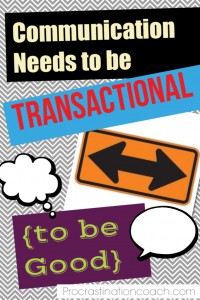 Since I spend my days working as a psychologist, I spend a lot of time thinking about, participating in, and looking at communication and communication dynamics. I think about:
Since I spend my days working as a psychologist, I spend a lot of time thinking about, participating in, and looking at communication and communication dynamics. I think about:
- what people are saying
- what they are not saying
- what they want to say
- what I want and don’t want to say
- the meaning of periods of silence
Of course, that’s not an exhaustive list, because communication is such a fascinatingly broad field of play.
Here’s a list of some of the lessons about successful communication I’ve learned over the years:
- What we communicate is not conveyed just in words, but how we add our intention, motivation, and feeling into the words we use. Inject your words with your curiosity, your wisdom, your humor, your drive, and/or your personality when you speak. When you do, your words will really resonate with those listening.
- The energy of communication between two or more people is live, and not fixed. Though we may try mightily to predict what others might say, we have slim chances of doing so because communication is a veritable dance of human energy and creativity. Enjoy the playing involved in communicating, and avoid trying to control what’s being said.
- Listen well to be a good communication partner. Let others know you are interested in what they say by listening closely (to what is and is not being said) when they are talking. Good communication often involves patience, as there may be misunderstandings to work through before communication becomes clear.
- What people say to us does not bind us. We decide to be bound or not bound to those words and to people. Do not be afraid of what’s being said. But do be very aware and mindful of how you react to what’s being said.
- Fulfill your own responsibility in making sure the communication is clear. If there are discrepancies in times or dates, for example, play it safe and reconfirm details ahead of time to avoid finding yourself in a last-minute rush or panic. I’m including this lesson here because I recently screwed up a lunch date because I assumed everything will work out just as I think it will.
- Communication is an incredibly powerful method to combat anxiety. That’s the whole premise behind psychotherapy, after all. When you put words to your problems, you begin to develop a sense of mastery over your fears. Talk it out. You can do it.
- What you are most afraid of saying aloud is likely the issue you need to address most. What you are trying to say matters so much more than how you say it, also.
- When you feel free to communicate openly and when you need to, you are likely in a healthy environment or relationship. The inverse of this is also true.
- Communication needs to be transactional. We need not fuss and worry over what we say or feel our words will “make” or “break” things. We are not the only ones responsible for making communication successful; those we are speaking to share that responsibility and should participate as such.
When Procrastinators begin to rely heavily on avoidance and denial, good communication tends to go out the window. When Procrastinators feel backed into a corner because of disorganization, lack of preparation, anxiety, or workblock, they may lie to others or isolate themselves in order to feel better. Unfortunately, when we lie or isolate ourselves from others, our stress tends to escalate quickly, because communication is no longer meaningful or effective at getting our point across.
It’s never too late to change how you communicate. But good communication only happens with good practice and trust that your words will see you through.
News to Share:
Registration Going on Now for the October Workout Group
If you are interested in learning more about communication or feel you could use some coaching in that area, sign up for the Procrastination Coach October Workshop Group. The first lesson will be on communication. The weeks following will include lessons on time management, control and perfectionism, and tools to maintain progress post-Procrastination. Membership for the month is $10. I think you’ll dig it.




Great article on an important topic, Dr. Li! Communication seems to become more and more complicated — not harder, specifically, just more complicated — as we add so many additional forms of media to the mix.
For me, one line of your article really resonated — “Do not be afraid of what’s being said. But do be very aware and mindful of how you react to what’s being said.” I have to spend some more time thinking about that one. I absolutely react to what is being said!
Great reply, Andie, thanks. I have learned to listen to what’s not being said…oftentimes, that element is huge. I’m probably inclined to do that because I spent so many of my younger years not talking much at all! Best wishes on your wonderful new blog and your work.
Christine
Christine, your observations shine a light on the “how” of improving communication.
One point that particularly draws me is this, “What people say to us does not bind us,” and that whole section about being mindful that I can choose to respond well (rather than simply react, which is not my best choice, as I have discovered). Thank you for this post.
Hi Dena,
Thank you for your lovely response note. You are a ray of light via your work and I’m sure in other ways too.
Best,
Christine
Hi Christine:
I love your list. Though I’m doing much better, sometimes I struggle with #7. Thanks for the encouragement “It’s never too late to change how you communicate.” Thanks
Hi Kelvin,
I’m a big fan of your work. Thanks for your reply and for the love. Best wishes on the further development of your blog.
Christine